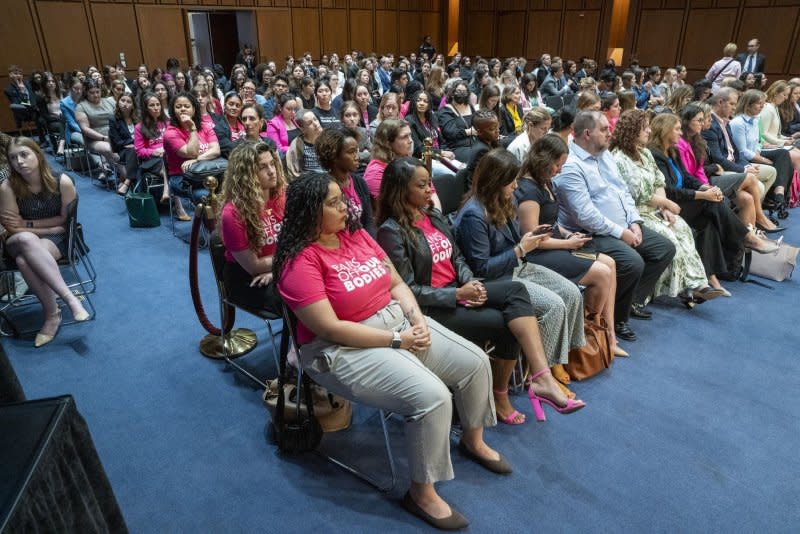Senate hearing examines state abortion bans, 'assault on women's freedoms'

June 4 (UPI) -- Almost two years after the U.S. Supreme Court's Dobbs decision that overturned Roe vs. Wade and federal abortion rights, a Senate hearing in Washington, D.C., on Tuesday examined how state abortion bans have "created a healthcare nightmare across America."
Democratic Sen. Patty Murray of Washington state, who chaired the two-hour Health, Education, Labor and Pensions, or HELP, Committee hearing, called the abortion bans "horrifying" as Democrats increase their focus on reproductive rights ahead of the November election.
"A forced pregnancy does not have to make headlines to make someone's life a living hell," Murray told lawmakers.
"And it is harrowing to think that we live in a reality where forced pregnancy has become so widespread -- so rampant -- that only the most dystopian stories get national attention."
A forced pregnancy does not have to make headlines to make someone's life a living hell.
And it is harrowing to think that we live in a reality where FORCED PREGNANCY has become so widespread-so rampant-that only the most dystopian stories get national attention. pic.twitter.com/2QNhHjIA0y— Senator Patty Murray (@PattyMurray) June 4, 2024

"Right now in America, more than a third of women of reproductive age live in states where they essentially don't have the choice to end a pregnancy if they need to," Murray said. "Instead, Republicans have made the choice for them with extreme abortion bans and cruel restrictions on access to care."
"No woman -- no one -- should be dragged through a pregnancy against their will," Murray added.

Currently, there are 14 states with complete abortion bans and 21 states that restrict the procedure earlier in pregnancy than those standards set by Roe. As of December, nearly one in five women are forced to travel out of state for abortion care, according to Murray who recounted stories about women impacted by the bans.
Republican Sen. Bill Cassidy of Louisiana blasted Murray's remarks, claiming Tuesday's hearing was not about a genuine interest in reproductive healthcare but rather a means to score political points.
"So let's table set: It's an election year in which a Democratic incumbent president is running behind. So a decision has been made to raise abortion to a high profile, to change the setting, to invite a lot of folks to put us on TV," Cassidy told lawmakers. "It's partisan politics being played out in a committee hearing."
Dr. Nisha Verma, a fellow with Physicians for Reproductive Health in Atlanta, was one of several doctors who testified at the hearing, saying politicians have no place making healthcare decisions for women.
"I myself have struggled with infertility and I've experienced a first-trimester miscarriage that I found devastating, and so I am not at all saying that pregnancies don't have value," Verma testified. "That value is different for different people."
"I just want to highlight that 90% of abortions in this country occur in the first trimester and less than 1% are occurring after 20 weeks," she added.
Dr. Christina Francis, chief executive officer at the American Association of Pro-Life Obstetricians and Gynecologists in Indiana, testified against any late-term abortion.
"I think, certainly, beyond the point where a child can survive outside of his or her mother, there would never be a reason you would need to intentionally end that child's life," Francis said. "You would simply deliver that baby."
Democratic Sen. Tim Kaine of Virginia blasted the idea that states, not the federal government, should legislate abortion.
"Your rights shouldn't depend on what ZIP code you live in, your rights shouldn't depend on who your state legislature is," Kaine said, as Republican Sen. Lisa Murkowski of Alaska offered a conciliatory note.
"I also believe it's reasonable not to require those who are firmly opposed to abortion to support it with their tax dollars and that providers, who do not wish to be involved in abortions, should not be forced to do so," Murkowski said.
On Tuesday, House Democrats introduced a contraception access bill, as the Senate is scheduled to vote on the Right to Contraception Act on Wednesday.
"I don't want to hear from Republicans that they support contraception, but won't make it the law of the land," Democratic Sen. Elizabeth Warren of Massachusetts wrote Tuesday in a post on X.
"Tomorrow, every senator will have to say where they stand. I'm voting for the Right to Contraception Act. It's time we codify contraception into law."

